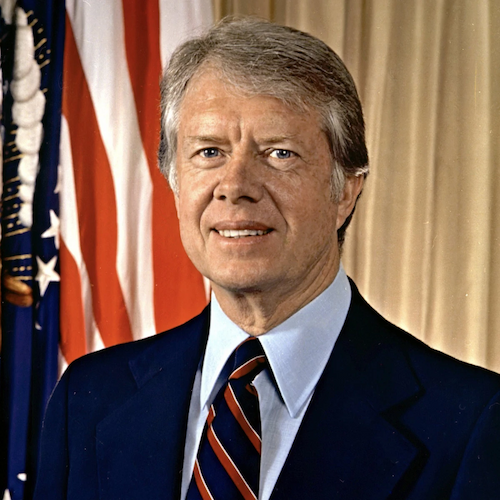Jimmy Carter served as the 39th President of the United States from 1977 to 1981.
Early Life
James Earl Carter Jr. was born in Plains, Georgia on October 1, 1924 to parents James Earl Carter, Sr., a businessman and farmer and Lillian Gordy Carter, a nurse. He graduated valedictorian of his class at Plains High School. He then attended Georgia Southwestern College and the Georgia Institute of Technology before graduating from the United States Naval Academy in the top ten percent of his class.
Early Career
In the Navy, he served as a submariner, achieving the rank of lieutenant. Admiral Hyman Rickover selected Carter to join the nuclear submarine program, where he served as a senior officer on the second nuclear submarine. When his father died in 1953, Carter resigned his naval commission and returned to Georgia to be with his family and to run the family farming business. He quickly became a leader in the community and served on the county’s board of education.
In 1962, Carter won election to the Georgia state senate and served for two terms. On January 12, 1971, he became Georgia’s 76th Governor. He served as the Democratic National Committee campaign chairman for the 1974 congressional and gubernatorial elections.
Presidency
In December 1974, Carter announced his candidacy for President of the United States. He won the Democratic Party nomination and was elected on November 2, 1976. He served one term from 1977 to 1981, during a time of serious problems at home and abroad.
Carter achieved significant accomplishments in foreign policy, including work on the Panama Canal treaties, the Camp David Accords, the treaty of peace between Egypt and Israel, the Salt II treaty with the Soviet Union, and the establishment of the U.S. diplomatic relations with the People’s Republic of China.
Domestically, a faltering economy, increasing inflation rates, and high unemployment led Americans to blame Carter for the country’s economic woes. Carter’s administration attempted to propose an energy program to encourage conservation and alternative sources of energy, but the U.S. Senate squashed the effort.
While Carter had success in foreign affairs, the public’s lack of confidence in his executive abilities led to his defeat in the 1980 presidential election.
Post-Presidency
Carter remained active in his work in diplomacy and advocacy and was awarded the Nobel Peace Prize in 2002. He became the longest living president in American history. At 98 years old, he announced in February 2023 that he would forgo any further medical treatment and “spend his remaining time at home with his family.”






